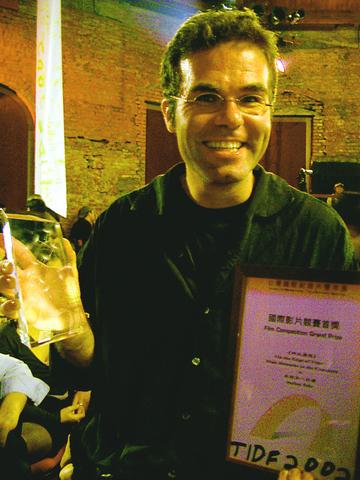The Taiwan International Documentary Festival ended yesterday with an award ceremony handing out prizes for outstanding film and video documentary works.
German filmmaker Stefan Tolz took away the top prize, the Grand Prize, in the international film competition category, with his film, On the Edge of Time: Male Domains in the Caucasus, winning a cash prize of NT$300,000.

PHOTO: YU SEN-LUN, TAIPEI TIMES
The two second prize awards were given to Israeli director David Fisher's Love Inventory and Danish film Family by Phie Ambo-Nielson and Sami Martin Saif, each winning a cash prize of NT$100,000.
Taiwanese director Tang Shiang-chu's (
"In this film festival, we seem to have walked through the Caucasus, Siberia, temples in Taipei and an island in Bolivia. And we have learned how to fish in Norway, to lead a life as a homeless person in Buenos Aires and to climb the mountains of Hsinchu. ? This is the great thing about this festival," said jury member Alan Rosenthal referring to the films in the international film competition.
"We had a very smooth meeting. All the awards were decided without much disagreement," added Lee Daw-ming (
The winning film, On the Edge of Time: Male Domains in the Caucasus depicts a multi-ethic male-dominated culture and a simple lifestyle that seems to have been forgotten by time.
The jury gave this film the top award because of the enormous difficulties that had been overcome while shooting in the remote Caucasus region.
Tolz expressed great excitement at receiving the award for a film he said had previously been rejected by a German TV station. He was now able to prove them wrong.
"I have to thank the people of the Caucasus for opening their hearts to my camera," Tolz said as he got ready to celebrate his victory.
"My original idea was inspired by the millennium. I wanted to find a place where people live in a different time, without mobile phones or computers."
David Fisher's Love Inventory, a film digging into the filmmaker's own family secrets, took a second place Merit Award. Although the film has already picked up prizes in Berlin and at the Israeli Academy Awards, Fisher said this award was special to him. "I remember the warm reception I received here and the good questions from the audience. Also, I'm happy to show an Israeli film that is not about war or national historical problems," said Fisher.
In fact, the filmmakers found more than just a passionate audience for their films. They also found a market, with PTS, Taiwan's public TV network, expressing interest in some of the works.
In the international video competition category, the Grand Prize was given to Katorga by Russian filmmaker Evgeny Solomin, winning NT$100,000.
The two Merit Prizes are given to Zhao Liang (
Taiwanese filmmaker Zero Chou's (周美玲) Poles Extremity (極端寶島) and Finnish filmmaker Maria Lappalainen's On Edge were given Special Mention prizes in the video awards.
The two Taiwan Awards, designed to recognize local filmmakers, were given to Tseng Wen-chen (
The NETPAC Award, an award given by the Network for the Promotion of Asian Cinema, was given to Korean film Sky-blue Hometown by Kim So-young, about a Russian Korean painter in Uzbekistan. The film also won Best Documentary at the Pusan International Film Festival in 2000 and Yamagata International Documentary Film Festival in 2001.

Mongolian influencer Anudari Daarya looks effortlessly glamorous and carefree in her social media posts — but the classically trained pianist’s road to acceptance as a transgender artist has been anything but easy. She is one of a growing number of Mongolian LGBTQ youth challenging stereotypes and fighting for acceptance through media representation in the socially conservative country. LGBTQ Mongolians often hide their identities from their employers and colleagues for fear of discrimination, with a survey by the non-profit LGBT Centre Mongolia showing that only 20 percent of people felt comfortable coming out at work. Daarya, 25, said she has faced discrimination since she

It is one of the more remarkable facts of Taiwan history that it was never occupied or claimed by any of the numerous kingdoms of southern China — Han or otherwise — that lay just across the water from it. None of their brilliant ministers ever discovered that Taiwan was a “core interest” of the state whose annexation was “inevitable.” As Paul Kua notes in an excellent monograph laying out how the Portuguese gave Taiwan the name “Formosa,” the first Europeans to express an interest in occupying Taiwan were the Spanish. Tonio Andrade in his seminal work, How Taiwan Became Chinese,

April 21 to April 27 Hsieh Er’s (謝娥) political fortunes were rising fast after she got out of jail and joined the Chinese Nationalist Party (KMT) in December 1945. Not only did she hold key positions in various committees, she was elected the only woman on the Taipei City Council and headed to Nanjing in 1946 as the sole Taiwanese female representative to the National Constituent Assembly. With the support of first lady Soong May-ling (宋美齡), she started the Taipei Women’s Association and Taiwan Provincial Women’s Association, where she

More than 75 years after the publication of Nineteen Eighty-Four, the Orwellian phrase “Big Brother is watching you” has become so familiar to most of the Taiwanese public that even those who haven’t read the novel recognize it. That phrase has now been given a new look by amateur translator Tsiu Ing-sing (周盈成), who recently completed the first full Taiwanese translation of George Orwell’s dystopian classic. Tsiu — who completed the nearly 160,000-word project in his spare time over four years — said his goal was to “prove it possible” that foreign literature could be rendered in Taiwanese. The translation is part of